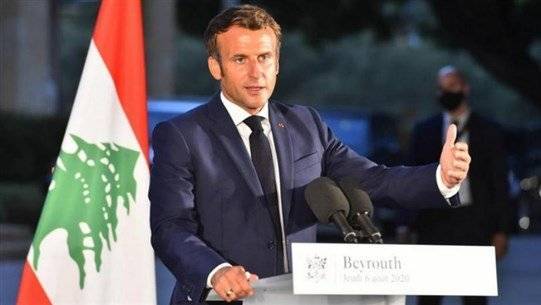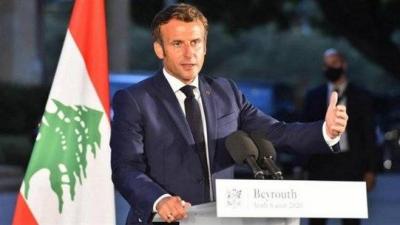The current French role in Lebanon may appear as an enigma, with unclear short- and long-term objectives. However, a brief overview of French activity in the past two years clarifies that the United States remains the driving force behind this role within defined limits. On the eve of an imminent challenge (the appointment and formation of a new government), the presence of the "Élysée" seems modest compared to its dealings after the explosion at the Port of Beirut (August 4, 2020), but it is not absent, as some might portray.
Several indicators suggest that France continues its old-new pursuit to penetrate the Lebanese arena, despite the international landscape shaped by the Russian-Ukrainian war. Notably, it has maintained communication with all political forces in the country, including Hezbollah, with the relationship currently experiencing a cessation of hostilities, as desired by the French themselves, evidenced by periodic meetings between the two parties. The latest message in this regard came days ago with the disclosure of a visit by the French ambassador in Beirut, Anne Grillo, to Haret Hreik. Subsequently, French Foreign Ministry official Inas Ben Karim met with Hezbollah officials. Ben Karim, a diplomat in charge of Lebanon, Syria, Palestine, and Egypt, previously served in Lebanon and has a wide network of relations. Although her visit to Beirut was to participate in meetings concerning UNRWA, she held a series of undisclosed side meetings with Lebanese figures and parties.
It is no secret that French political weight has diminished in recent months after it was inflated following the Beirut port explosion, which was reflected in the decline of enthusiasm that accompanied President Emmanuel Macron's visits and those of his team during that period. The subsequent internal and external developments shifted Paris from wanting to be a maker of the new republic to a partner aligned with the United States, and only to the extent allowed.
Initially, they aimed to help reshape the government and initiate investigations following the port explosion, provide assistance to the Lebanese people, negotiate with the IMF, and push for reforms and anti-corruption measures, among other lofty slogans. However, their involvement in these areas has now downgraded to "advice and opinion, and sometimes inquiry."
Two years ago, the French attempted, through their so-called initiative, to establish a specification and condition checklist for the future government, insisting on a government of specialists while discussing isolation of the political class and imposing sanctions. They held two conferences, one to support Lebanon in 2020 and another to support the Lebanese Army the following year. The intent of mentioning this is to illustrate the contraction of this role; currently, the French are only signaling their lack of objection to the reappointment of Prime Minister Najib Mikati for forming the government again. However, they deny—according to their official representatives in Lebanon—any preparations for a new conference in France similar to the San Claudio one (2007). Political sources in Lebanon and French media outlets have hinted at rumors of a French desire to hold a new conference at the beginning of next autumn to initiate dialogue among Lebanese. According to information from "Al-Akhbar," the French ambassador in Beirut denies any knowledge of such a thing, and French officials during their sessions with political forces do not mention the matter, as stated by several prominent political sources.
Furthermore, diplomat Ben Karim denied that France is focusing on organizing Lebanese-Lebanese dialogue, reiterating that Paris is today concentrating on ensuring Lebanese adherence to the timely execution of constitutional obligations, notably the need to form a new government after elections and to hold presidential elections as scheduled without delay, in addition to ensuring Lebanon's commitment to agreements leading to a deal with the IMF regarding international aid programs.
Between these two extremes, Lebanese officials meeting with the French team in Lebanon have sensed a decline in their eagerness to change the Governor of the Central Bank, Riad Salameh, and hold him accountable as well, asserting that there are no alternative names available, although they previously had candidates to succeed him. However, they currently consider that "the time is not right to change him," noting that French judicial authorities state that the government's stance does not affect their ongoing work regarding Salameh, his brother, and others, and that the French judiciary continues its investigations and communication with judicial authorities without being influenced by the government's or presidency's stance, especially if tied to political calculations.
It can be said that France has lost an opportunity it "may not recover" to play a role in Lebanon that exceeds its size in external balances. However, it would not be accurate to claim that it has left Lebanon; rather, it may be waiting for a free opportunity to increase its leverage internally. This is reflected in the following facts:
- Despite constitutional deadlines in France, which involve changes in the diplomatic and governmental team, and the impact of the war in Ukraine on Europe and Paris's preoccupation with its repercussions, France intentionally registers its presence in Beirut through diplomatic engagement.
- Paris closely monitored the recent parliamentary elections and remains focused on their outcomes, considering the arrival of a “change” bloc in Parliament a victory for itself. The French ambassador in Beirut has begun holding meetings with several change MPs to extend congratulations on their electoral success and discuss upcoming challenges.
- Observers note a serious French follow-up on financial reform processes, with French officials asking daily about its details. Pierre Duquesne, the official in charge of the file, continues to track this with the relevant parties in Lebanon, and the French have succeeded in convincing Prime Minister Najib Mikati and various ministers to have experts from France assist in these administrations, particularly regarding the electricity file, where Electricité de France aims to oversee any project for building plants or renewing transmission and distribution networks. Additionally, France is keen to be the responsible party for organizing the distribution of any financial aid to NGOs according to the program agreed with Saudi Arabia, which involves providing approximately $75 million to support Lebanon outside state institutions.
- The French show considerable interest in investment projects, especially regarding the reconstruction of the port. This is exemplified by the awarding of management, operation, and maintenance contracts for the container terminal at the Port of Beirut to the global French company (CMA CGM) for ten years. Paris appears eager to secure a larger share in this facility later. This explains the ongoing communication with Minister of Public Works Ali Hamie, who visited France months ago at a renewed invitation.
- Perhaps the most notable point is the French commitment to engaging with Hezbollah through regular meetings with its officials. This does not imply a special relationship between the two; rather, it reflects a cautious relationship that the party does not view as detrimental. However, Paris undoubtedly finds some utility in this, knowing that its role would not be effective if the party imposed a veto. Notably, the French side consistently insists on telling the party that it is the only European or Western entity that speaks with it despite US sanctions and the many European nations labeling Hezbollah entirely as a terrorist organization.
While the French openness is enveloped in an economic and investment framework, informed sources connect it to underlying objectives that go beyond merely "helping Lebanon out of the crisis or merely reserving a place in it." In the political backdrop of what Paris is doing are larger headlines that might reach the extent of playing a role in normalizing relations ongoing in the Arab world, where cooperation between "Israel" and France has reached advanced stages. Given "Israel's" importance in French perception, sources suggest that "attempts to keep the door open with the party," an unwelcome prospect in "Tel Aviv," may hold in its depths what Paris erroneously believes could "fall within the interests of Israel later."




